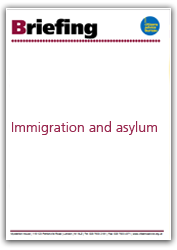Supporting justice

The case for publicly-funded legal representation before the Asylum Support Tribunal
Supporting justice evidence briefing [ 160 kb]
Summary
Every year, more than half a million people use one of the various tribunals comprising the Tribunals Service to seek justice in a dispute about their employment, their welfare benefits or child support, their social care, their immigration status, or their child’s special educational needs. Many of these tribunal users are poor, and vulnerable. But among them there is one group of especially vulnerable people who often have no money even to buy food, accommodation and other essentials. They are the some 2,000 asylum seekers and failed asylum seekers who appeal to the Asylum Support Tribunal each year against a refusal or termination of asylum support by the UK Border Agency.
Based on our study of all the substantive decisions made by the Tribunal in the six-month period October 2008 to March 2009, this briefing shows this group of tribunal users to be notably disadvantaged in terms of two factors that bear heavily on their ability to present their case: their proficiency in English; and their socio-economic circumstances. Most require an interpreter to participate in the tribunal hearing, and the great majority – 80 per cent – are either already homeless and/or destitute, or will become so if their appeal to the Tribunal is dismissed. It also shows that legal representation before the Tribunal increases the chances of success from 39 per cent, to between 61 and 71 per cent – a ‘representation premium’ of 22-32 per cent.
Concluding that the Tribunal’s users are especially vulnerable and disadvantaged, relative to other tribunal users, this briefing – which is endorsed by the four organisations below – repeats our previous call for publicly-funded legal representation before the Tribunal. And it suggests that the annual up-front cost of providing such representation – of the order of £300,000 – could be met entirely from the savings that would flow from an evidently much needed improvement in the quality of the UK Border Agency’s initial decision-making on asylum support.

